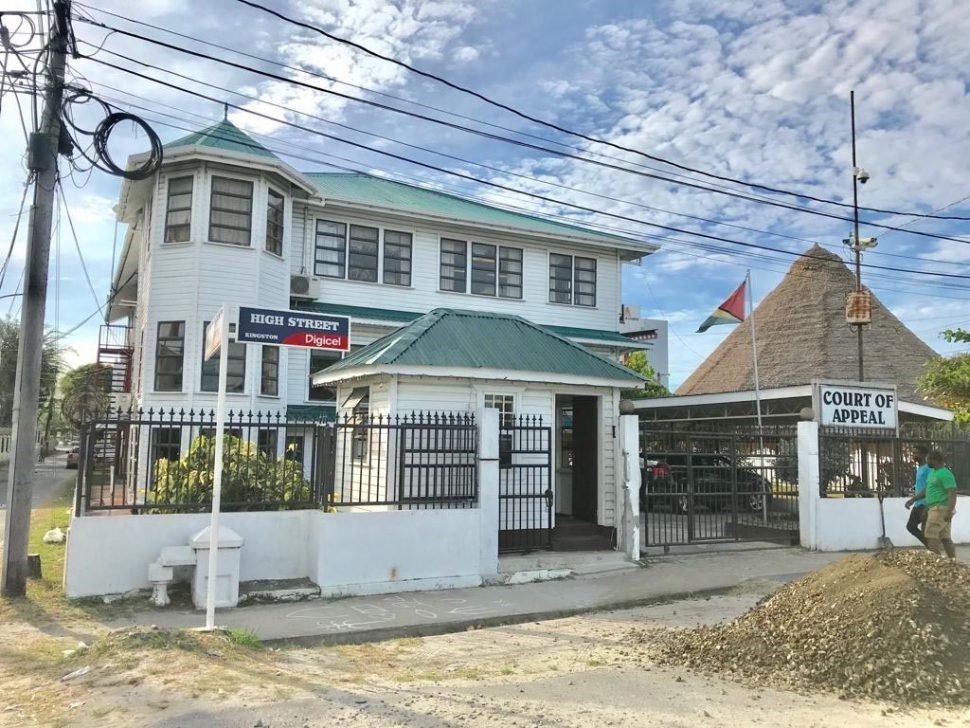Now that the Guyana Court of Appeal has spoken, the no-confidence motion (NCM) case and its variegated repercussions will wend their way to the Caribbean Court of Justice (CCJ) for final resolution.
The majority decision of the court on Friday came as a surprise. The ruling that 34 is the requisite majority in the National Assembly for the purposes of the NCM is utterly unconvincing. If the formula of the two justices was adopted and consideration taken of the high importance of this case then the majority on the three-person panel would be three – truly astounding. It remains the case that those who have argued for 34 as a majority have inserted the word ‘absolute’ into their pleadings where this term is not present in the article in question and is hardly implied in the rest of the constitution. On those grounds alone the case for 34 should fail as article 106 (6) is pellucid on its very own and should not be adulterated by the language of expediency.
It will not go unnoticed to the CCJ that a separate branch of government – the legislature ruled that the NCM was properly passed, reiterated this finding upon an inquiry by the government and that this decision was not interfered with by the High Court.
The layman should also be forgiven for believing that the principle of stare decisis should be applicable in this case. Aside from the government, many of the main proponents of the egregious 34 argument had fully accepted that 33 was the trigger for the fall of a government under article 106(6). This was the basis upon which now Prime Minister Nagamootoo presented his motion of no confidence in 2014, seconded by now Minister Hughes and later adopted by all members of the opposition benches including now President Granger and Attorney General Williams and Minister Ramjattan. Presumably, then Speaker Trotman would have also seen it that way and would have admitted its passage on the count of 33 to 32. Even just prior to the passage of the motion on December 21, 2018, all of the speakers on the government side accepted that one defector could cause them to lose the vote. They fully accepted that 33 was the viable number and the contrived after-the-fact argument of 34 has little validity or credibility. How much more opportunistic can our politicians become in the quest to cling to power and only for its sake?
In the meanwhile, the decision of the court must be adhered to. It would then be the case that Parliament would function normally and would be recalled to continue with the government’s legislative agenda which has been on hold for several months. It is advisable that the government tries to fully engage with the opposition on matters which should be expedited for the smooth running of vital sectors of the economy such as sugar, bauxite and oil and gas. It is presumed that since the hiatus in January that the government does have important pieces of legislation to bring and that this should be expedited.
While the government will now fastidiously adhere to the Court of Appeal ruling and seek the same respect from all other stakeholders, it must be pointed out that this was not the way it treated with the passage of the motion of no confidence. In particular the government made no attempt to give immediate recognition to the Chief Justice’s ruling that Cabinet was considered to have automatically resigned on the night of December 21st. The Cabinet continued to function and later in the guise of a “plenary” when pressure was brought to bear. It also continued to take notice of state contracts. All of this clearly flouted the intent and meaning of the Chief Justice’s findings.
With the Court of Appeal’s ruling the merry go-around between government and the Guyana Elections Commission will come to a halt. There is no imperative at this point to declare a date for general elections. Here again, the government defied the intent of the parliamentary motion of no confidence and the Chief Justice’s ruling that elections be held in 90 days. President Granger and GECOM dithered over the period so they could then conveniently agree that general and regional elections were not possible in three months from December 21, 2018 even though they made no good faith effort to meet that date. GECOM is now again on notice that it must begin preparations to hold general elections as it may still be required to do at short notice. If the CCJ overturns the Court of Appeal ruling, the country will again be faced with the requirement for urgent elections though the court may have to advise on how this should be engineered as the three-month period would have elapsed without an enlargement of the period by Parliament. At that point, the farcical insistence by the four government-controlled members of GECOM on house-to-house registration won’t fly. The President will have to immediately name a reasonable date for elections and GECOM will have no choice but to meet this.
Even though it is adamantly resisting the requirement for early general elections, the government is now in full campaign mode and the expenditure of public funds in this enterprise veers close to the abuse of the public purse.
In the period leading up to the CCJ ruling it would be wise for the government to enter into discussions with the opposition and civil society stakeholders on how the various options can be addressed in a manner that minimises internal upheaval and tensions.




